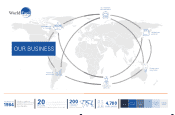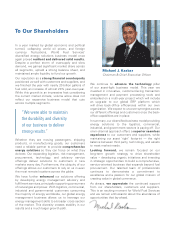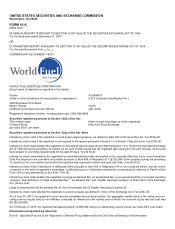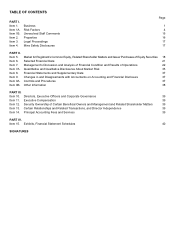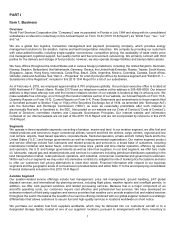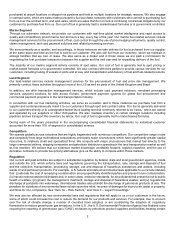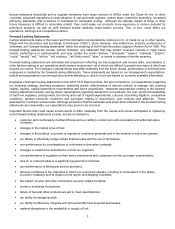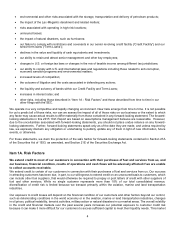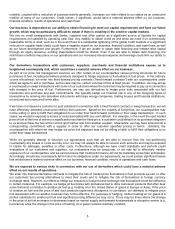World Fuel Services 2015 Annual Report Download - page 11
Download and view the complete annual report
Please find page 11 of the 2015 World Fuel Services annual report below. You can navigate through the pages in the report by either clicking on the pages listed below, or by using the keyword search tool below to find specific information within the annual report.6
We also enter into proprietary derivative transactions, primarily intended to capitalize on arbitrage opportunities associated
with basis, time, quality or geographic spreads related to fuel products we sell. Proprietary derivative transactions, by their
nature, often entail exposure to adverse changes in commodity prices in relation to our proprietary positions. Although we
have established limits on such exposure, any such adverse changes could result in losses. The risks we face because of
our use of financial derivatives can be exacerbated by volatility in the financial and other markets. In addition, we may fail
to adequately hedge our risks or could otherwise incur losses if our employees fail to comply with our policies and
procedures with respect to hedging or proprietary trading, for example by engaging in unauthorized trading activity, failing
to hedge a specific financial risk or failing to observe limits on exposure, which could subject us to financial losses that
would have a material adverse effect on our business, financial condition, results of operations and cash flows.
Finally, the majority of our derivatives are not designated as cash flow hedges for accounting purposes, and we therefore
recognize changes in the fair market value of these derivatives as a component of revenue or cost of revenue (based on
the underlying transaction type) in our consolidated statements of income and comprehensive income. Since the fair value
of these derivatives is marked to market at the end of each quarter, changes in the fair value of our derivative instruments
as a result of gains or losses may cause our earnings to fluctuate from period to period.
Third parties who fail to provide products or services to us or our customers as agreed could harm our business.
We purchase fuel and other products from suppliers and resell to customers. If the fuel and other products we sell fail to
meet the specifications we have agreed to with customers, we could incur significant liabilities if a customer initiates a claim
or a lawsuit for which we settle or results in a decision against us. In addition, our relationship with our customers could be
adversely affected and adverse publicity about any allegations of contaminated products may negatively affect us,
regardless of whether the allegations are true. Although in most cases we have recourse against our suppliers for products
that fail to meet contractual specifications, such recourse cannot be assured and may be costly to enforce. For example,
several of our supply agreements are with foreign entities, including foreign governments, and are governed by the laws of
foreign jurisdictions. If a supplier breaches such agreement, then we may incur the additional costs of determining our rights
and obligations under the agreement, under applicable foreign laws, and enforcing an agreement in a foreign jurisdiction.
Any significant liability in excess of any applicable insurance coverage could have a material adverse effect on our business,
financial condition, results of operations and cash flows.
We also use third parties to provide various services to our customers, including into plane fueling at airports, fueling of
vessels in port and at sea and delivering land based fuel. The failure of these third parties to perform these services in
accordance with contractual terms for any reason, such as their inability to supply specified fuel or an interruption of their
business because of weather, environmental or labor difficulties or political unrest, could affect our relationships with our
customers and subject us to claims and other liabilities that could have a material adverse effect on our business, financial
condition, results of operations and cash flows.
Due to our international operations, we are subject to U.S. and international laws, including U.S. economic
sanctions, the Foreign Corrupt Practices Act (“FCPA”) and similar anti-bribery laws, which can impose significant
compliance costs and subject us to civil or criminal penalties for non-compliance.
Doing business on a worldwide basis requires us to comply with the laws and regulations of the U.S. government and
various international jurisdictions. These regulations place restrictions on our operations, trade practices and partners and
investment decisions. In particular, our international operations are subject to U.S. and foreign anti-corruption laws and
regulations, such as the FCPA and the U.K. Anti Bribery Act, and economic sanction programs administered by the U.S.
Treasury Department’s Office of Foreign Assets Control (“OFAC”). The FCPA prohibits us from providing anything of value
to foreign officials for the purposes of influencing official decisions or obtaining or retaining business and the U.K. Anti
Bribery Act prohibits bribery both in the United Kingdom and internationally, as well as bribery across public and private
sectors. As part of our business, we regularly deal with state owned enterprises, the employees of which may be considered
foreign officials for purposes of the FCPA. In addition, some of the international jurisdictions in which we operate lack a
developed legal system and have higher than normal levels of corruption. Our activities in these countries create the risk of
improper payments or offers of payments by one of our employees or other parties acting on our behalf.
Furthermore, international trade controls, including economic sanctions, export controls and anti-boycott regulations, are
complex, restrict our business dealings with certain countries and individuals, and are constantly changing. Further
restrictions may be enacted, amended, enforced or interpreted in a manner that materially impacts our operations. From
time to time, certain of our subsidiaries have limited business dealings in countries subject to comprehensive OFAC
administered sanctions. These business dealings currently represent an insignificant amount of our consolidated revenue
and income and generally consist of the provision of services pursuant to licenses issued by OFAC or as otherwise permitted
by applicable sanctions regulations. As a result of the above activities, we are exposed to a heightened risk of violating anti-


